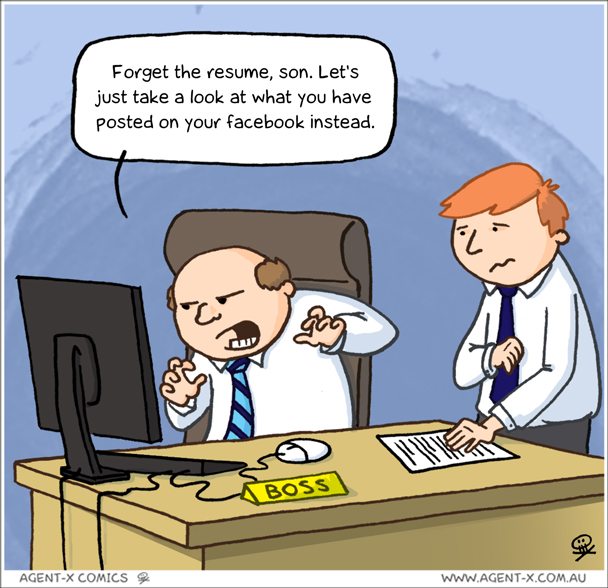Most employers check out potential new hires on facebook these days.
According to CareerBuilder.co.uk, more than half (53%) of employers research potential job candidates on social networks such as Facebook, LinkedIn, Twitter, etc.
The days of simply relying on the candidates CV and what their referees say, is long gone.
Our ability to easily upload content to the internet from anywhere means that future employers will be tempted to look for this content in order to better understand what you may be really like.
They want to confirm that what you have on your CV is factual, and that you are not a secret sociopath who may cause damage to the company in the future. Also, human nature being what it is, they just want to know stuff about you.
A decent percentage of employers do admit to finding out items online, which has persuaded them to not hire a candidate.
For example, this article discusses a female psychiatrist being passed over for a role, due to pictures posted on facebook.
And it does not end at getting the job.
As I have blogged about before, you can get “facebook fired” ifyou decide to post negative comments about fellow workers or the company that employs you.
The rise of activity like this has led to companies such as Reputationdefender.com, and many others, springing up. Reputationdefender.com offers to monitor your Web reputation for $10 USD a month, plus a one-time fee of $30 USD to remove something from the internet, if an unwanted item somehow gets out of control.
This is a good service and may be very useful to some people.
I still believe that the simplest course of action to defend your reputation, is simply to use your common sense.
If that fails, then here are some quick tips to keep in mind:
- IF you want to post suspect comments, blogs or pictures, then make sure of your privacy settings first.
- BEFORE you add work colleagues as facebook friends, set up a group with limited privacy settings, and add them to that group. Then (if you need to) you can post things that they do not have permissions to view.
- IF you must post a suspect/spicey/goatse image online, try using an anonymous image loader, such as imgur.com.
Then, the image url cannot be traced back to you. - PRIVATE twitter accounts are easy to set up. Use one if you want to tweet & share privately. Just lock the account and off you go.
- ADULT dating sites don’t always need your face in the picture. However, you still need to use your head when using them.
- COMMUNITIES can be forgiving or they can turn on you. THINK before you post.
- When something gets posted online, it can remain there FOREVER. Even if you try to delete it. There are backups, copies and caches to make sure nothing is lost.
(Although Twitter now removes deleted tweets from searches, some services such as Friendfeed,or clients such as Tweetdeck, can retain these tweets.) - RESPECT other people’s content and be aware that if you post or share their content it might breach copyright laws. For example, a photo that your friend took is their property, not yours. You can only post it online if you have their permission.
If you want to do well on the internet, I actually advise you to adopt a paranoid mindset, so that you will THINK BEFORE YOU POST. This will help make your online life much easier to enjoy.

3 Comments
Great advice….I would add to block tweets and facebook content from people who are not your friend.
[…] Via: Agent-X Comics […]
[…] Source: Agent-x.com.au function buildSocialThingy() { return ' […]